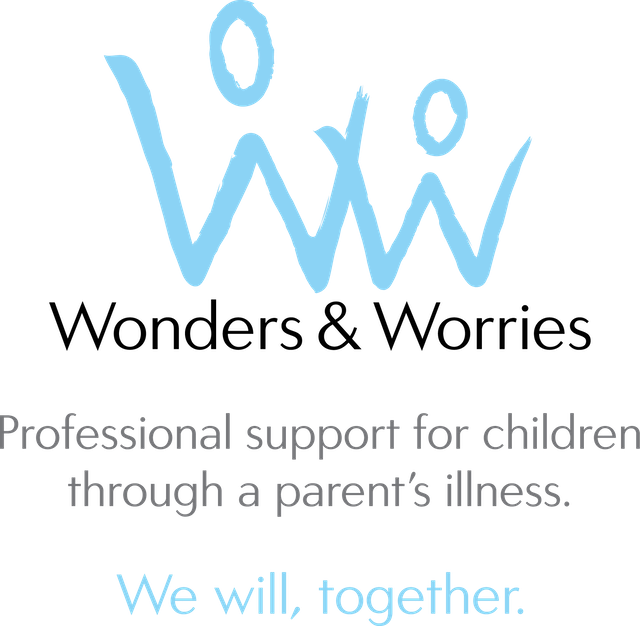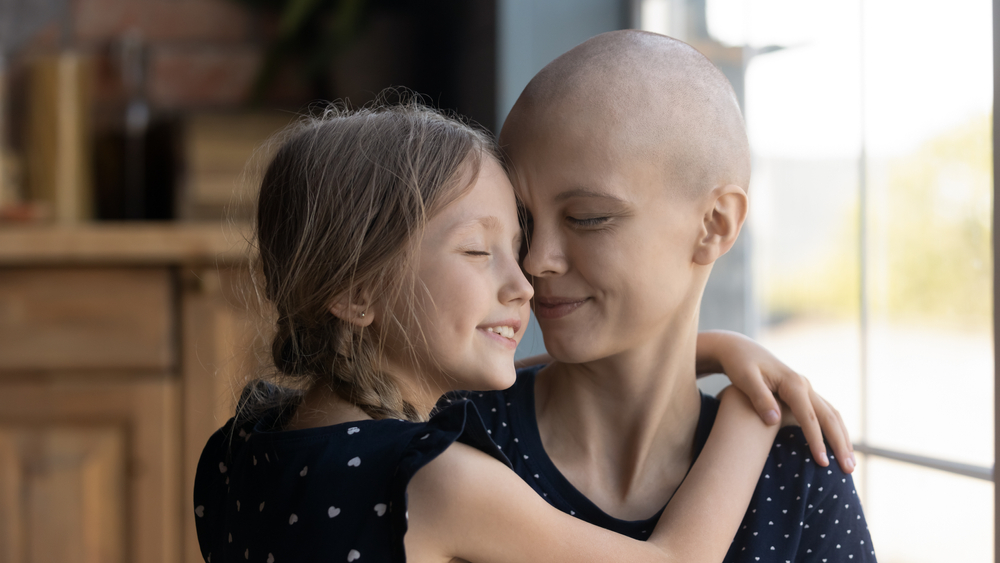
Communicating with children about a parent’s illness can be challenging, especially as you think about how the information may impact their lives and your life as a family. Below, we have outlined a variety of considerations to keep in mind as you plan out how to include your children in an open, honest, and accurate way. By doing so, you are protecting the trusting relationship you have and building a support line for continued communication and opportunities for self-expression.
Here is a video that describes one family’s story in talking with their children about a cancer diagnosis:
Of note, please consider supplementing the topics below with family-based activities: Rose, Thorn, and Bud | Telephone | Family Pictionary. Here is video explaining more about creating a Wonders & Worries Jar:

Children:
- Typically sense when something is going on in the family and fill in gaps with their own versions of the story (e.g., child thinking, “I heard mom whispering ‘cancer’ the other day…does she only have days to live?”).
- Want to handle crisis in a positive way and have the potential to cope with individualized support (challenges can be growth promoting experiences).
- Want to “protect” the adults in their life. By sharing information, they will be able to better understand how a parent is coping and with ongoing communication, may not feel such a burden to “protect.”
- Naturally self-dose hard information. If you are talking to them about an emotionally charged topic, they will give you indicators that they need a break, or if too little is shared, they may begin asking more questions.

Pre-Conversation Considerations:
- Ensure you have had some time to digest and process the information before you begin to share the news with others.
- Enlist the support of your partner (e.g., spouse, grandparent, aunt, best friend) when sharing the information so that you can lean on each other for support and so that the children realize that they can turn to either of you along the way.
- It may be helpful to separate siblings when having this conversation if there are significant differences in developmental age and/or temperament. By doing so, you can modify the language appropriately and be more specific with the support that is offered.
- Younger children have shorter attention spans and are less focused on the future.
- Older children are more future focused; with this, they may have greater concerns and specific questions pertaining to the illness, treatment plan and future.
- Children with unique needs will benefit from an individualized plan for information sharing (e.g., using a story board, focusing on facts and not feelings, etc.)
- Timing the conversation during a point in the day when they can transition to an enjoyable activity afterwards can be helpful. Before bedtime would not be a suitable time for this conversation.
- Supplies to consider having on hand:
- Water can provide a momentary outlet if needing extra time to think through a thought before responding to a question or comment.
- Having a selection of fidget items available can provide children with a stress relief outlet during the conversation.

Initial Communication Plan:
- Begin conversations early on so that children develop a context for the situation and can be included throughout the course of illness. Conversations may start with, “There is something important I’d like to talk with you about…”
- Share information about the illness.
- Describe the origin of the illness so that children understand they did nothing to cause the illness (and if you aren’t sure of the cause, it’s okay to state that here).
- Emphasize how the illness is not contagious (if that is the case) so children understand that this type of illness is different than a cold they could catch from another person.
- Another critical component is to talk about how the illness will be managed and what the plan is moving forward.
- If you are sharing information about a chronic illness, it is important to talk about how the illness is not curable: “This is an illness I will have for the rest of my life. While doctors cannot make it go away, they can provide medicines to help me manage my illness. I’ll be going to medical appointments regularly as I learn how to best manage my health.”
- Before helping your child transition to an enjoyable activity, asking a few questions to determine what they understood can be helpful.
- “Have you heard of ______ before? Does what we’ve shared today go along with that information?”
- “Can you share with me a little about what you learned from our conversation?”
- “What part of my body isn’t working as well as it should?”
- “What will I be doing to help manage my health?”
- When ending the conversation, it’s helpful to wrap up by focusing on family strengths. “We are going to get through this together. We are going to celebrate each day in different ways.”

Ongoing Communication Plan:
- Create time for family meetings and ongoing communication about the illness so that there is time for information sharing and for children to express feelings and ask questions. Having a mailbox or jar in the home can be helpful for children (and/or caregivers) to put questions as they arise throughout the week/month before a family meeting. This gives children a holding space for any worries they may have. And if there aren’t any specific questions, here are some prompts:
- Tell me about another time when you have heard someone talk about_____.
- Name some things you are wondering about.
- What is something I said about ______ that was confusing/strange/or surprising?
- Repetition is important for children as they process information at their own pace and sometimes need to take in new information gradually. With this, your child may ask the same question repetitively from conversation to conversation. This may be them not remembering, or maybe more of an emotional need for reassurance.
- Prepare to talk about big questions that may come up and it is okay not to have all the answers. Have them write down their question(s) for you to take to the medical team at your next appointment and/or use reflective questioning to help learn more about their question (e.g., “Can you help me understand why you are thinking about that?”).
Child: “Are you going to die?”
Parent: “That’s a good question. It can be hard to not have all of the answers, can’t it? Sometimes people with this illness do die, but the doctors have shared with me that with medicine and this upcoming surgery, I’m going to get better. If things change at any point, I will be sharing that information with you – you can count on that.”

Self-Expression and Coping:
- Share how you are feeling about the situation so children understand that feelings they may be having are normal. Example: “This is hard news to hear, and I’ve been feeling sad about it. It’s okay if you are feeling sad, too. When I’m feeling sad, I try to think about even just one thing that brings me joy.”
- Model coping with unknowns that may be part of having an illness. Example: “When I find myself thinking about the future and my illness a lot, I try to take deep breaths and imagine a favorite place to be. This helps to calm down my worries.”
- Routines help children feel a sense of security, especially during times of change. If the midday routine is shifting often, it’s great to at least keep the bookends for the day consistent (morning and evening routine).
- Engage your children in self-expressive activities (music, drawing, building, etc.).
- Help children play as an outlet for fun, to process, to cope, and to connect with friends. Keep in mind that children will turn to play especially after hearing potentially hard information. This is normal and helps children continue to process information.
- Encourage children to communicate with other support people as well. This may be helpful if the child believes that their question(s) or feelings might upset the ill parent.

What if…
- Children become very emotional: If emotions take over the conversation, it’s okay to put the central focus on supporting your child and come back to the conversation at a later time. Additionally, it may be helpful to break up the conversation into many small meetings where you can dose the information that is shared and provide added coping support during and after each of these conversations.
- Children aren’t understanding: If children are not understanding the information, it may be helpful to re-think the approach and/or how the information is being communicated. You may want to consider including teaching tools, such as books or diagnosis specific activities, to help children better understand information in a more developmentally appropriate way. Connect with a child life specialist if you would like assistance finding resources specific to your unique situation.
- One difficult conversation leads to others: You may need to circle back with your children regarding some questions that come up; here are a few strategies:
- Sample response to unexpected questions – “Gosh, that’s a really great question, let’s think about that together….”
- Sample response to better understand what the child is asking – “Tell me more about what you are thinking/asking.”
- Sample response to circle back to the conversation while honoring the child – “Let’s write that down. That is important, and I want to take time to think about it.”
We are continually here to support you as you navigate the best plan for including your children throughout this medical situation. To connect with a child life specialist, please contact the Wonders & Worries Helpline at 1-844-WE-WONDER or [email protected].
Children have the capacity to thrive despite challenges when given honest information and individualized support. We will, together.

